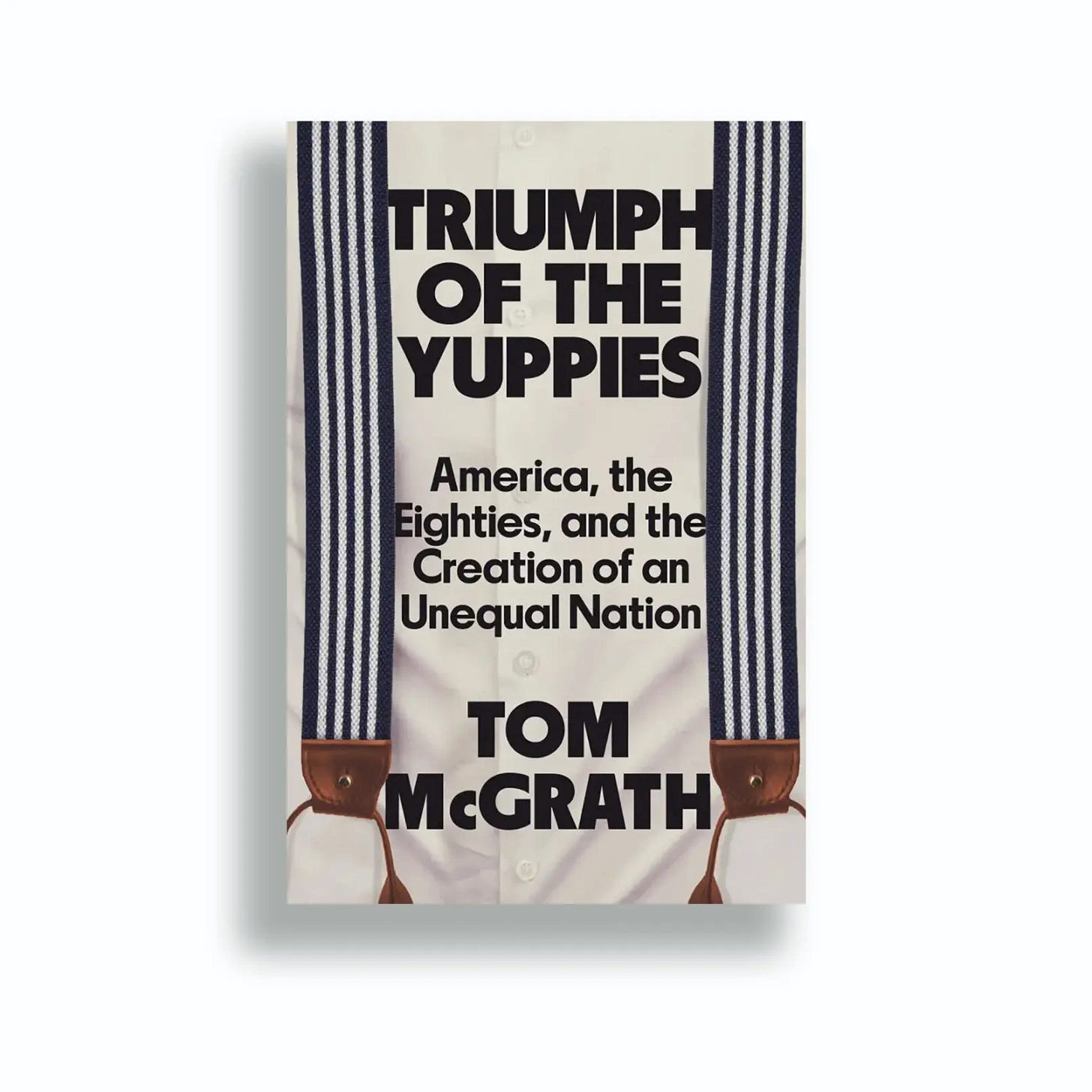Alluringly Crass? Yup.
In "Triumph of the Yuppies," Tom McGrath traces the rise and fall of a cultural phenomenon
For me, a title like Triumph of the Yuppies is catnip. I acquired this book because I thought it might help inform the elective I teach on American culture and politics 1970-2020, but also as a matter of nostalgia. Like author Tom McGrath, I was in college in the mid-eighties when the term “young urban professional” became what we now call a meme. Like him, I did not quite qualify as a matter of age and income, though I’d say we were both Yuppie-adjacent in our respective careers (he in journalism, me in teaching). It’s not exactly a badge of honor—indeed, it might even qualify as a mark of shame. But as this breezy book shows, there’s no mistaking the impact that Yuppies had in American life in the so-called Decade of Greed.
There’s a loose chronological arc in Triumph of the Yuppies, which spans from 1980 to 1987. McGrath has almost too perfect an emblem of the era with Jerry Rubin, the erstwhile Yippie of the sixties who became a prophet of self-actualization in the seventies before pivoting to Wall Street as a Yuppie in the early eighties. (He resurfaces periodically as he scrolls through a series of other schticks that include social networking—that would be in person, at Studio 54, in evenings before its transformation into a disco at 10 p.m.—to debating his old sidekick Abbie Hoffman and splitting the proceeds with their agent.
Along the way, McGrath takes us on a breezy tour of pop culture trends of the mid-eighties that include gentrification, retailing (from the Sharper Image to Grey Poupon), the transformation of finance, and neoconservative politics. The story ends with the stock market crash of 1987, which coincides with growing distaste for Yuppies, who came to be regarded as symbols of all that was wrong with America.
McGrath’s larger narrative is a familiar one: Yuppies as symbols of a growing divide in American society, which was becoming more unequal on a variety of fronts. McGrath offers a standard liberal critique of Ronald Reagan’s embrace of supply-side economics, and renders damning portraits of finance titan Michael Milken and General Electric CEO Jack Welch (all extending over a series of chapters). We get a foil in the form of Bruce Springsteen, whose Born in the USA glory days coincide with the height of the Yuppie craze. Walter Mondale is honored for his decency; Gary Hart is offered as the quintessential Yuppie politician, a forerunner to Bill Clinton.
As McGrath emphasizes, this is a generational story, the latest chapter in the saga of the Baby Boom. Not all Boomers were Yuppies, but Yuppies were quintessentially Boomers in the Great Expectations that shaped their lives And yet, as he notes, there’s melancholy undertow to all of this. Like their peers, Yuppies were acutely aware that the American geopolitical and economic pre-eminence into which they were born was beginning to ebb, and their materialism was a sometimes desperate lunge to secure comforts they could no longer take for granted. This pressure could be especially poignant for women, emancipated to pursue careers but struggling to balance them with a desire to replicate the joys of motherhood and family life while putting it on a new footing.
Like many critics of the Reagan era, McGrath is appalled by the supply-side logic of the time, reflected in tax policy, the mergers-and-acquisition craze, and mass-based status-seeking. He seems to suggest that capitalists like Welch and politicians like Reagan caused these trends (or at least exacerbated them) without really tracing their deeper roots in the larger transformation of the global economy. There’s no question the United States began eating its technological and economic seed corn in these years. But one wonders if there was really any plausible alternative. America was never going to be Sweden, much less Japan. We live by our libertarianism, and will likely die by it.
Though he doesn’t run the story forward, it’s clear that the Yuppies have unmistakable heirs. These include the so-called bourgeois bohemians David Brooks famously traced in his 2000 book Bobos in Paradise (one key difference: Bobos sentimentalized the counterculture of the sixties that Yuppies were eager to leave behind), and the meritocrats of the twenty-first century, who have now seized the commanding heights of cultural institutions like universities and the mass media. They are connected by their progressive politics, neoliberal economics, and a discreet embrace of materialism that is often denied even as it is fervently pursued. The large political bloc that has mobilized in opposition to this ideological genealogy is what elected Donald Trump in 2016. Like the Yuppies, it isn’t going away, even as both will continue to morph in its names and causes.



